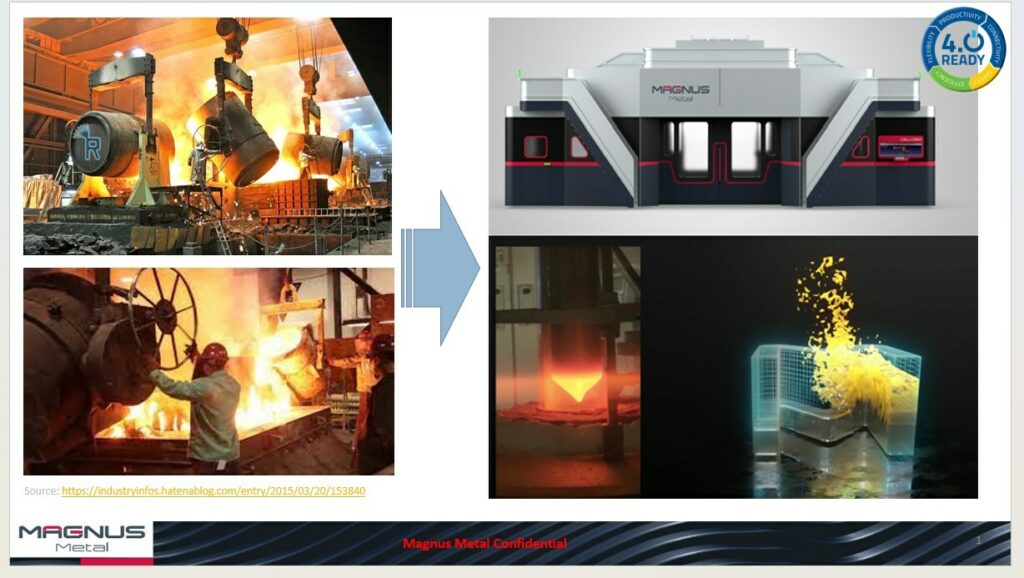
Magnus Metal’s Digital Casting™ is said to blend the benefits of additive manufacturing (AM) and traditional casting, while avoiding the typical deficiencies associated with the processes. (Image courtesy Magnus Metal/PRNewswire)
Magnus Metal is aiming to transform casting via a digital technology that is said to be capable of producing a ton of parts per day.
TEL AVIV, Israel—Industrial innovations that could potentially disrupt the centuries-old metal casting industry have been notoriously hard to come by. That hasn’t stopped additive manufacturing company Magnus Metal from building a bridge between the 4,000-year old metal casting process and what could become its digital, Industry 4.0 counterpart.
Magnus Metal has developed a technology called Digital Casting™, which blends the benefits of additive manufacturing and traditional casting while avoiding deficiencies typically associated with the processes. In a recent release, Magnus Metal described Digital Casting as “additive manufacturing technology for metal alloys, with the ability to produce one ton of parts [per] day.”
The technology is said to enable a streamlined supply chain, digital inventory, and remote manufacturing hubs without the need for a traditional foundry infrastructure.
“Magnus Metal’s technology is at the forefront of the digital casting revolution in metal production, forging transformations in sustainability, flexibility of design processes, and massively reducing the time spent in development,” said Magnus Metal CEO Boaz Vinogradov, in the release. “We remain faithful to the industry’s 4,000 years of tradition, while reimagining and refashioning how metals parts are produced for modern purposes.”
The U.S. manufacturing industry is projected to have approximately 2.1 million unfilled jobs by 2030, the release said, citing data from Deloitte. This shortfall has led many manufacturers to begin embracing automation to alleviate challenges to their production lines. Tightening environmental regulations, natural resource limitations, and global supply chain disruptions are also creating obstacles for metal casting foundries.
But according to Magnus Metal, these challenges are also highlighting opportunities for innovation. The company said its technology alleviates multiple burdens on metal manufacturing, enabling a more efficient and intuitive casting process with a more bespoke and sustainable final product.
“We are excited to bring our unique capital equipment, industry 4.0 environmentally friendly, advanced processes, and digital know-how and apply them to the metal casting process, driving it into a new digital era,” Vinogradov added.
Magnus Metal’s Digital Casting technology adopts Industry 4.0 standards, leading to what the company called “vastly improved safety, sustainability, and financial outcomes.” Its data-driven process is reported to provide marked efficiencies. By requiring 40-to-60 percent less raw material, it significantly lowers overarching cost and decreases the burden on natural resources. The removal of traditional tooling creates time savings of 6-to-18 weeks while producing parts that are 10-to-20 percent stronger than the conventional alternative, with fewer defects, the company said in the release.
Magnus Metal’s process allows up to one ton of solid metals to be manufactured in a fully controlled environment, customized and crafted within a purpose-built, standalone platform. It enables a production lifecycle that requires less material, manpower, and time, the company said.
According to Magnus Metal, it is the only additive manufacturing company that meets the American Society for Testing and Materials (ASTM) standards for iron. Through Magnus Metal, the design-to-manufacturing cycle is shortened, raw materials are efficiently used, and quality control is elevated. “This is metal casting at the cutting edge,” the company said in the release.
Magnus Metal recently raised $74 million in Series B funding, co-led by Entrée Capital and Target Global. Additional investors included Caterpillar Ventures, Tal Ventures, Deep Insight Ventures, Awz Ventures, Lumir Ventures, Discount Capital, Lip Ventures, Cresson Management, Next Gear Fund. and Essentia Venture Capital. Magnus Metal said it will use the latest capital to further develop its innovative casting technologies, while expanding its operations locally and globally to support its Fortune 100 customers.
“We co-led this investment based on customers’ demand for Magnus Metal’s solution in order to on-shore production lines to overcome supply chain and quality issues,” said Entrée Capital’s Ran Achituv, in the release. “Digital Casting is the only technology that allows reduction of production cost, meeting environmental regulations, meeting and surpassing quality standards, and [increasing] business agility with shortened delivery time and increased customization. It is the only solution that doesn’t require new engineering and design as it digitally casts parts using the current customer’s raw materials.”
